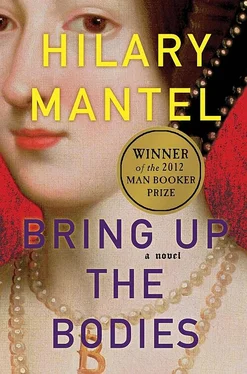She has made the same enquiry of Kingston. Perhaps she is asking everybody.
‘She talks of works.’ Cranmer shakes his head. ‘She says nothing of faith. And I hoped she understood, as I now understand, that we are saved, not by our works, but only through Christ’s sacrifice, and through his merits, not our own.’
‘Well, I do not think you should conclude that she was a papist all this time. What would it have availed her?’
‘I am sorry for you,’ Cranmer says. ‘That you should have the responsibility of uncovering it all.’
‘I did not know what I would find, when I began. That is the only reason I could do it, because I was surprised at every turn.’ He thinks of Mark’s boasting, of the gentlemen before the court twitching away from each other, and evading each other’s eyes; he has learned things about human nature that even he never knew. ‘Gardiner in France is clamouring to know the details, but I find I do not want to write the particulars, they are so abominable.’
‘Draw a veil over it,’ Cranmer agrees. Though the king himself, he does not shrink from the details, it seems. Cranmer says, ‘He is taking it around with him, the book he has written. He showed it the other evening, at the Bishop of Carlisle’s house, you know Francis Bryan has the lease there? In the midst of Bryan’s entertainments, the king took out this text, and began to read it aloud, and press it on all the party. Grief has unhinged him.’
‘No doubt,’ he says. ‘Anyway, Gardiner will be content. I have told him he will be the gainer, when the spoils are given out. The offices, I mean, and the pensions and payments that now revert to the king.’
But Cranmer is not listening. ‘She said to me, when I die, shall I not be the king’s wife? I said, no, madam, for the king would have the marriage annulled, and I have come to seek your consent to that. She said, I consent. She said to me, but will I still be queen? And I think, under statute, she will be. I did not know what to say to her. But she looked satisfied. But it seemed so long. The time I was with her. One moment she was laughing, and then praying, and then fretting…She asked me about Lady Worcester, the child she is carrying. She said she thought the child was not stirring as it should, the lady being now in her fifth month or so, and she thinks it is because Lady Worcester has taken fright, or is sorrowing for her. I did not like to tell her that this lady had given a deposition against her.’
‘I will enquire,’ he says. ‘About my lady’s health. Though not of the earl. He glared at me. I do not know for what cause.’
A number of expressions, all of them unfathomable, chase themselves across the archbishop’s face. ‘Do you not know why? Then I see the rumour is not true. I am glad of it.’ He hesitates. ‘You really do not know? The word at court is that Lady Worcester’s child is yours.’
He is dumbfounded. ‘Mine?’
‘They say you have spent hours with her, behind closed doors.’
‘And that is proof of adultery? Well, I see that it would be. I am paid out. Lord Worcester will run me through.’
‘You do not look afraid.’
‘I am afraid, but not of Lord Worcester.’
More of the times that are coming. Anne climbing the marble steps to Heaven, her good deeds like jewels weighting wrists and neck.
Cranmer says, ‘I do not know why, but she thinks there is still hope.’
All these days he is not alone. His allies are watching him. Fitzwilliam is at his side, disturbed still by what Norris half-told him and then took back: always talking about it, taxing his brain, trying to make complete sentences from broken phrases. Nicholas Carew is mostly with Jane, but Edward Seymour flits between his sister and the privy chamber, where the atmosphere is subdued, vigilant, and the king, like the minotaur, breathes unseen in a labyrinth of rooms. He understands his new friends are protecting their investment. They watch him for any sign of wavering. They want him as deep in the matter as they can contrive, and their own hands hidden, so that if later the king expresses any regret, or questions the haste with which things were done, it is Thomas Cromwell and not they who will suffer.
Riche and Master Wriothesley keep turning up too. They say, ‘We want to give attendance on you, we want to learn, we want to see what you do.’ But they can’t see. When he was a boy, fleeing to put the Narrow Sea between himself and his father, he rolled penniless into Dover, and set himself up in the street with the three-card trick. ‘See the queen. Look well at her. Now…where is she?’
The queen was in his sleeve. The money was in his pocket. The gamblers were crying, ‘You will be whipped!’
He takes the warrants to Henry to be signed. Kingston has still received no word of how the men are to die. He promises, I will make the king concentrate his mind. He says, ‘Majesty, there is no gallows at Tower Hill, and I do not think it would be a good idea to take them to Tyburn, the crowds might be unruly.’
‘Why would they?’ Henry says. ‘The people of London do not love these men. Indeed they do not know them.’
‘No, but any excuse for disorder, and if the weather stays fine…’
The king grunts. Very well. The headsman.
Mark too? ‘After some sort, I promised him mercy if he confessed, and you know he did confess freely.’
The king says, ‘Has the Frenchman come?’
‘Yes, Jean de Dinteville. He has made representations.’
‘No,’ Henry says.
Not that Frenchman. He means the Calais executioner. He says to the king, ‘Do you think that it was in France, when the queen was at court there in her youth, do you think it was there she was first compromised?’
Henry is silent. He thinks, then speaks. ‘She was always pressing me, do you mark what I say…always pressing on me the advantage of France. I think you are right. I have been thinking about it and I do not believe it was Harry Percy took her maidenhead. He would not lie, would he? Not on his honour as a peer of England. No, I believe it was in the court of France she was first debauched.’
So he cannot tell if the Calais headsman, so expert in his art, is a mercy at all; or if this form of death, dealt to the queen, simply meets Henry’s severe sense of the fitness of things.
But he thinks, if Henry blames some Frenchman for ruining her, some foreigner unknown and perhaps dead, so much the better. ‘So it was not Wyatt?’ he says.
‘No,’ Henry says sombrely. ‘It was not Wyatt.’
He had better stay where he is, he thinks, for now. Safer so. But a message can go to him, to say he is not to be tried. He says, ‘Majesty, the queen complains of her attendants. She would like to have women from her own privy chamber.’
‘Her household is broken up. Fitzwilliam has seen to it.’
‘I doubt the ladies have all gone home.’ They are hovering, he knows, in the houses of their friends, in expectation of a new mistress.
Henry says, ‘Lady Kingston must stay, but you can change the rest. If she can find any willing to serve her.’
It is possible Anne still does not know how she has been abandoned. If Cranmer is right, she imagines her former friends are lamenting her, but really they are in a sweat of fear until her head is off. ‘Someone will do her the charity,’ he says.
Henry now looks down at the papers before him, as if he does not know what they are. ‘The death sentences. To endorse,’ he reminds him. He stands by the king while he dips his pen and sets his signature to each of the warrants: square, complex letters, lying heavy on the paper; a man’s hand, when all is said.
He is at Lambeth, in the court convened to hear the divorce proceedings, when Anne’s lovers die: this is the last day of the proceedings, it must be. His nephew Richard is there to represent him on Tower Hill and bring him the word of how it was accomplished. Rochford made an eloquent speech, appearing in command of himself. He was killed first and needed three blows of the axe; after which, the others said not much. All proclaimed themselves sinners, all said they deserved to die, but once again they did not say for what; Mark, left till last and slipping in the blood, called for God’s mercy and the prayers of the people. The executioner must have steadied himself, since after his first blunder all died cleanly.
Читать дальше
Конец ознакомительного отрывка
Купить книгу












